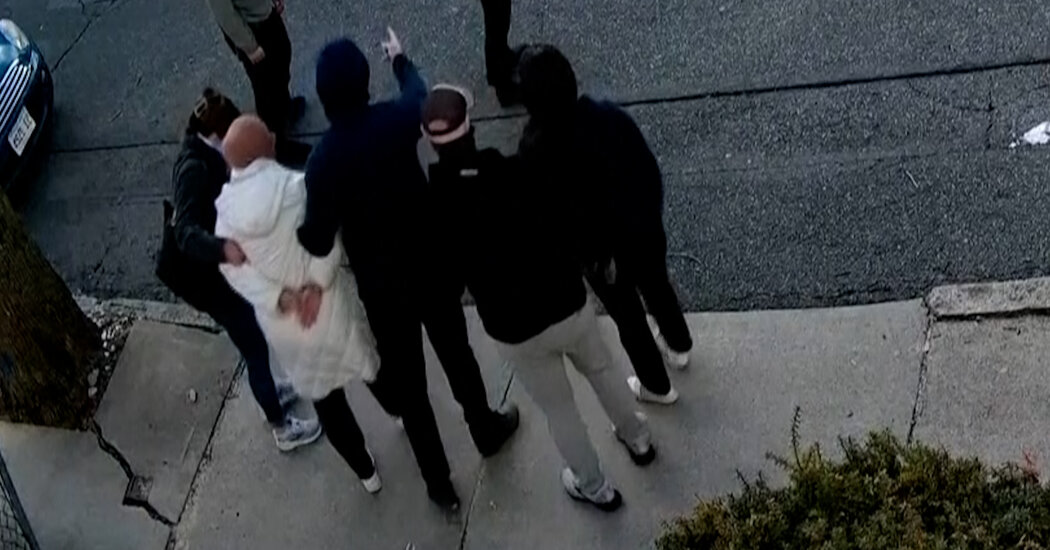
What Is Your Reaction to the Arrests of Student Protesters by Federal Immigration Agents?
Have you seen videos of Ms. Ozturk’s arrest? Have you read about the detention of other students, like the Columbia University graduate Mahmoud Khalil?
What have been your reactions? Do you support the Trump administration’s efforts to detain and deport international college students? Or do you think these actions are a violation of civil liberties — including free expression and due process?
In “What We Know About the Detentions of Student Protesters,” Kate Selig gives an overview:
The Trump administration is trying to deport pro-Palestinian students and academics who are legally in the United States, a new front in its clash with elite schools over what it says is their failure to combat antisemitism.
The White House asserts that these moves — many of which involve immigrants with visas and green cards — are necessary because those taken into custody threaten national security. But some legal experts say that the administration is trampling on free speech rights and using lower-level laws to crack down on activism.
Secretary of State Marco Rubio told reporters on his plane on Thursday night that the State Department under his direction had revoked the visas of possibly more than 300 people and was continuing to revoke visas daily. He did not specify how many of those people had taken part in campus protests or acted to support Palestinians but said “there’s a lot of them now.”
She continues:
Who is being targeted?
The nine people who have been pursued and, in some cases, detained by federal officials include current and former students and professors. Most of them have publicly expressed pro-Palestinian views. Some have green cards, making them lawful permanent residents. Others have student visas, which allows foreign nationals to enter the United States for full-time study.
The extent of their involvement in pro-Palestinian advocacy varies. Mahmoud Khalil, a lawful permanent resident who is believed to be the first to be taken into custody, helped lead high-profile protests at Columbia University against Israel’s war in Gaza. Mr. Khalil, who has Palestinian heritage, is married to an American citizen who is eight months pregnant. He was sent to a detention center in Louisiana.
The administration has also targeted students who have been less involved. Rumeysa Ozturk, a Turkish citizen and graduate student at Tufts University, was taken into federal custody on Tuesday. She had drawn the attention of a right-wing group that claims to combat antisemitism on college campuses and publicizes its findings online after helping write an opinion piece in the student newspaper criticizing the university’s response to pro-Palestinian demands.
Tricia McLaughlin, a spokeswoman for the Department of Homeland Security, said investigators with that agency and Immigration and Customs Enforcement “found Ozturk engaged in activities in support of Hamas, a foreign terrorist organization that relishes the killing of Americans. A visa is a privilege, not a right.” She did not offer evidence or details of that support.
A video of Ms. Ozturk’s detention, showing plainclothes agents from the Homeland Security Department detaining her as she was heading out to break her Ramadan fast with friends, has circulated widely online. “This video should shake everyone to their core,” her lawyer, Mahsa Khanbabai, said in a statement on Wednesday. Ms. Ozturk is being held in Louisiana.
As it scrutinizes people living in the United States, investigators for ICE have been searching videos, online posts and news clippings of campus protests against the Israel-Hamas war. The government also appears to be getting information from private organizations.
Is this legal? Can the government detain and deport someone for expressing a certain view? The First Amendment, after all, protects freedom of speech in nearly absolute terms. It allows people to espouse even the most unsavory views, including support for genocide, and face no criminal penalty as a result.
But does the Constitution protect noncitizens’ freedom of speech? In a Morning newsletter headlined “Immigrants and Freedom of Speech,” German Lopez looks at that question. Here are excerpts:
Trump’s case
The Supreme Court has said that the First Amendment applies to noncitizens in the United States when it comes to criminal and civil penalties. But those protections don’t necessarily apply to deportations, the court has found. The federal government has nearly absolute power over immigration, including its ability to deport noncitizens; it gets to decide who comes and then stays in this country, potentially at the expense of constitutional rights.
The piece continues:
More specifically, administration officials cite a 1952 statute that lets the government deport immigrants, even green-card holders, for views that hamper U.S. foreign policy. The administration says that Khalil and others supported Hamas and Hezbollah, designated terrorist groups. That supposed support seems to be limited to the immigrants’ advocacy — social media posts, fliers, protests, attendance at a Hezbollah leader’s funeral. The government has not accused them of sending money or other assistance to those groups. It says that speech is enough to justify deportation.
The opposition
This approach leaves immigrants with no practical free speech rights, Nadine Strossen, former president of the A.C.L.U., told me. The First Amendment allows us to speak freely without fear of legal retribution. But if an immigrant’s political advocacy gets him deported, he does have to worry about retribution — and may choose not to speak at all.
While conservatives may feel empowered now, their approach could backfire in the future. Suppose that conservative immigrants — say, Trump-supporting Venezuelans, known as MAGAzuelans — attend a Make America Great Again rally. A Democratic administration could claim that participants of the rally supported an enemy of the United States by, for example, opposing aid to Ukraine. That administration could then try to deport the immigrants for their speech.
This is the slippery slope of exceptions to free speech and other constitutional rights: What counts as a violent act? What is a terrorist group? Who is an enemy of the United States? What does it mean to support them? A president can twist the answers to these questions to fit any agenda and go after people with opposing views, bypassing fundamental rights.
Finally, though so far in this forum we have focused on the crackdown on college students, in his article, Mr. Lopez points out that these are not the only efforts at deportation that have raised concerns. While immigrants have due process rights, the Trump administration has tried to bypass those protections in other cases. It cited the Alien Enemies Act of 1798 to deport hundreds of Venezuelan migrants without any kind of hearing in court.
The Trump administration claimed, on the basis of little more than whether they had tattoos or had worn clothing associated with criminal organizations, that these migrants were members of criminal gangs supported by the Venezuelan government.
Source link


